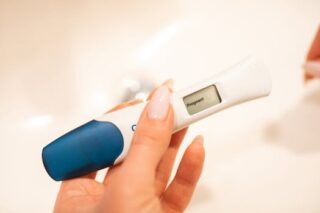
More Women's Health & Beauty Articles
What Are Normal HCG Levels at 2 Weeks Pregnant?

When you’re just starting your pregnancy journey, one of the first things you may find yourself wondering about is hormone levels, specifically human chorionic gonadotropin, or HCG. Understanding what normal HCG levels look like when you’re 2 weeks pregnant can be crucial for expecting parents who are keen on tracking their pregnancy progress. This hormone is produced shortly after the embryo attaches to the uterine lining, and its levels can provide insight into the health of the pregnancy.
Understanding 2 Weeks Pregnant HCG Levels
At 2 weeks pregnant, you are technically in the early days of the first trimester, and HCG levels are just beginning to rise. It is important to remember that technically, at 2 weeks gestational age, you may not be “pregnant” in lay terms, as ovulation and fertilization might have just occurred. At this stage, HCG levels can vary greatly from one individual to another. Generally, many healthcare providers don’t recommend checking HCG levels until further along, around 4 to 5 weeks of pregnancy, when levels are expected to rise more significantly.
It’s also worth noting that the rate at which HCG levels double can be a more reliable indicator of a healthy developing pregnancy. For most women, levels will double approximately every 48 to 72 hours. However, levels can still vary quite a bit, so it’s important to discuss your specific situation with your healthcare provider.
Factors Influencing HCG Levels
HCG levels can be influenced by several factors. For instance, the exact moment of implantation can affect initial levels. Additionally, different pregnancies in the same individual can show different HCG levels. Other factors like multiple pregnancies, such as twins or triplets, can naturally result in higher HCG levels.
Having an understanding of what can affect HCG levels allows you to be better prepared when discussing your concerns with healthcare professionals. It is also crucial to remember that HCG levels are just one part of the picture when it comes to monitoring early pregnancy health.
What To Do If You’re Concerned About HCG Levels
If you have concerns about your HCG levels, it’s always best to consult with your healthcare provider. They may suggest regular blood tests to monitor the hormone levels over time, which can provide a clearer picture of how your pregnancy is progressing. Sometimes, your provider might pair HCG monitoring with early ultrasound scans for additional insight.
Concerns about low or high HCG levels can naturally arise. However, it is essential to know that variations do exist, and a single measurement is often not definitive. A series of tests showing consistent trends are usually more telling.
Other Early Symptoms of Pregnancy
While monitoring HCG levels can give you vital information about your pregnancy, there are other early signs of pregnancy you might notice. These can include missed periods, tender breasts, fatigue, nausea, and increased urination. Recognizing these symptoms can sometimes be just as important as hormone measurements in the early weeks of pregnancy.
For further insight into various developmental stages, you may find the article on understanding the stages of pregnancy development helpful, albeit it focuses on another aspect of health.
Long-Term Use of HCG Levels in Pregnancy Monitoring
Beyond the first few weeks, HCG levels continue to play a significant role in pregnancy monitoring. From confirming pregnancy to evaluating its progress, HCG is a powerful tool used by healthcare providers to ensure the well-being of both mother and baby.
As the pregnancy progresses, the focus may shift to other indicators such as fetal growth and development seen through ultrasound images. Regular prenatal check-ups will allow healthcare providers to monitor a range of health indicators to keep your pregnancy on a healthy track.
For more detailed scientific information, you can explore resources such as this article from Wikipedia on Human Chorionic Gonadotropin.
Being informed about these aspects not only helps prepare you mentally but also enables more meaningful dialogues with your healthcare provider. Understanding 2 weeks pregnant HCG levels is just the start of a journey that involves many more checks and balances to ensure both mother and child remain healthy and safe.
- HCG is a crucial hormone for confirming and monitoring pregnancy in its early stages.
- Normal HCG levels can vary widely; trends over time are more telling than single measures.
- Several factors, such as implantation timing and multiple pregnancies, can influence HCG levels.
- Other early pregnancy symptoms include missed periods, nausea, and breast tenderness.
- Regular consultation with healthcare providers is essential for personalized pregnancy care.
FAQ
What is HCG, and why is it important?
HCG, or human chorionic gonadotropin, is a hormone produced during pregnancy. It helps maintain the corpus luteum and supports early pregnancy growth.
How is HCG measured?
HCG levels are measured via blood tests, which can detect the hormone earlier than urine tests. This is often part of early pregnancy monitoring.
Can low HCG levels indicate a problem?
Low HCG levels can sometimes indicate a problem, but not necessarily. It’s the trend or pattern of HCG levels over time that provides clearer insights.
Is an ultrasound necessary if I have low HCG levels?
An ultrasound may be recommended to accompany HCG monitoring, especially if results are inconsistent or low, to gather more information about pregnancy health.
Can high HCG levels indicate twins?
Yes, higher than average HCG levels can sometimes indicate multiple pregnancies, such as twins or triplets, though other factors can also cause elevated levels.
Other Articles You May Find of Interest...
- How to Find the Right Vaginismus Treatment Professional
- Recognizing Breast Pain: When Should You Be Concerned?
- The Role of the Female Prostate in Women’s Health and Sexual Function
- Natural Techniques to Induce Labor Safely and Effectively
- Why Do I Feel Nauseous Every Morning When I’m Not Pregnant?
- The Journey of Uterine Involution: A Vital Process After Childbirth
- Is Pepcid Safe During Pregnancy? What You Need to Know














